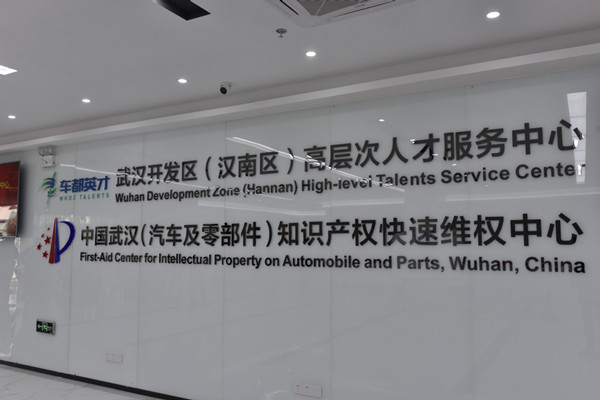

The logo of the First-Aid Center for Intellectual Property at Wuhan Development Zone (Hannan District), Hubei province is seen in this photo. [Photo/Zhao Shiyue for chinadaily.com.cn]
Shen Huayu, the research and development manager of Wimanu Network Technology Co Ltd in Wuhan, Hubei province, no longer had to worry about the office rental, talent recruitment and accounting problems that troubled him before. After the tech startup moved into a small and medium-sized enterprises' incubator in Donghu High-tech Zone, Shen could completely devote himself to software development while outsourcing the company's administrative functions to a third party.
"For micro-startups like us, we lack everything in hardware and software facilities when operating a business, such as working space, employees and human resources support," Shen said. "The incubation park offers us a variety of services to nurture the company's growth." About two years ago, he rented one room as an office for three employees.
Wimanu Network Technology is one the 6,000 SMEs that have settled in Miracle-Bridge incubation space launched in 2015. It provides co-working areas and comprehensive business advisory supports for entrepreneurs in software, online education, e-commerce, cultural and creative industries.
"With the guidance of professional mentors at Miracle Bridge, we have applied the subsidy for high-tech companies of around 200,000 yuan ($29,900) issued by Wuhan government," Shen Huayu noted.
Creative Capital, another business incubator and accelerator in Wuhan's Hongshan district, breeds diversified creative culture startups and has formed an industrial cluster that combines art workshop, museum, animation base, tech SMEs, e-sports and online game companies.
To serve over 500 enterprises co-working in the area, the incubator offers shared office, financial service and innovation platforms to further optimize business environment.
Xu Zhen, the assistant general manager of Wuhan Mobile Games Technology Co Ltd, said he was very thankful to the incubator for measures taken tiding them over difficulties during the COVID-19 outbreak. "The zone exempted office rent of our company for two months, and extended tax payment deadline to ease financial burden and cash flow problem."
According to Hu Fenglin, deputy director of Wuhan Bureau of Technology and Economic Information in Hongshan District, the exemption in house rent for startups reached over 1 million yuan after the virus outbreak, and local government has issued about 27 million yuan in subsidy for high-tech driven companies.
As Wuhan eyes innovation to drive economic growth, protection of intellectual property is of greater importance than before in key areas and core technologies. In 2019, the First-Aid Center for Intellectual Property started operation at Wuhan Development Zone (Hannan District), which specializes in handling disputes in the automobile sector, while also providing IP review, IP protection and mediation services for enterprises in need around Hubei province.
"Time for IP review on a design patent, for example, has fallen to seven days compared with five to six months before," said an official in the center.
Liu Hui, president of the research institute of Wuhan Shengyu Drainage System Co Ltd, said the company developed rapidly after First-Aid Center speeded up IP review and simplified application procedures.
"We own over 800 independent intellectual property rights in urban drainage and wastewater treatment," Liu said. "However, it used to take one to two years to get a patent for invention approved, while the time now is three months or less."